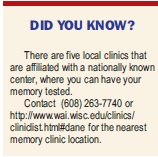MADISON — You’ve arrived home for the holidays, and something just seems amiss. You can’t quite put your finger on it, but something is just not the same as it has been in the past.
Dad/Grandpa doesn’t talk as much as he usually does, and he seems a bit anxious about having people in the house. He’s not as quick to respond when asked something, and if he answers a question at all, it’s more like a grunt or a mumble. Mom/Grandma seems to be working extra hard, almost like she’s trying to cover for something? Is she doing some of Dad’s tasks (or vice versa)?
When a parent or grandparent begins to realize that they may not be functioning as well as they once were, they may become scared and a little embarrassed; they may attempt to hide it. They may worry someone will take them out of their home and “put them away.” It is not unusual for one parent or grandparent to pick up the responsibility and try to cover for the other.
What should you do? Observe closely, rather than asking them. Ask other siblings, family members, and family friends if they have noticed a change. If your concerns are validated, call the 24/7 Alzheimer’s Association Helpline (1-800-272-3900), and ask to speak with a care consultant who can assist you in how to approach your grand/parent(s) and become a good early detection advocate for them. Most family members want to do something, but often really don’t know what the next steps are.

Early detection of memory issues is critical because it empowers your loved one to take the next step, by possibly ruling out dementia and treating those memory issues that can be treated.
Other conditions can also cause memory changes, like thyroid problems and/ or vitamin B12 deficiency. The Alzheimer’s and Dementia Alliance of Wisconsin points out on their website: “The symptoms you are concerned about might be caused by a condition that is reversible.” (www.alzwisc.org; 608-232-3400)
The earlier your family member gets correctly diagnosed, the more active they can be in being a partner in the plans for their future. They can become knowledgeable and educated about the disease process; they can access treatments and services that could improve symptoms and extend their independence; they can tap into support services, reducing anxiety for themselves as well as their loved ones; they can develop a support system; they can establish sound communication and trust with their healthcare team; and they can plan for their care, explore living options, and proactively take care of financial and legal matters.
Give yourself and your loved ones the gift of early detection this year if you notice things askew in your family household. It will be the loving gift of a supportive family network.

